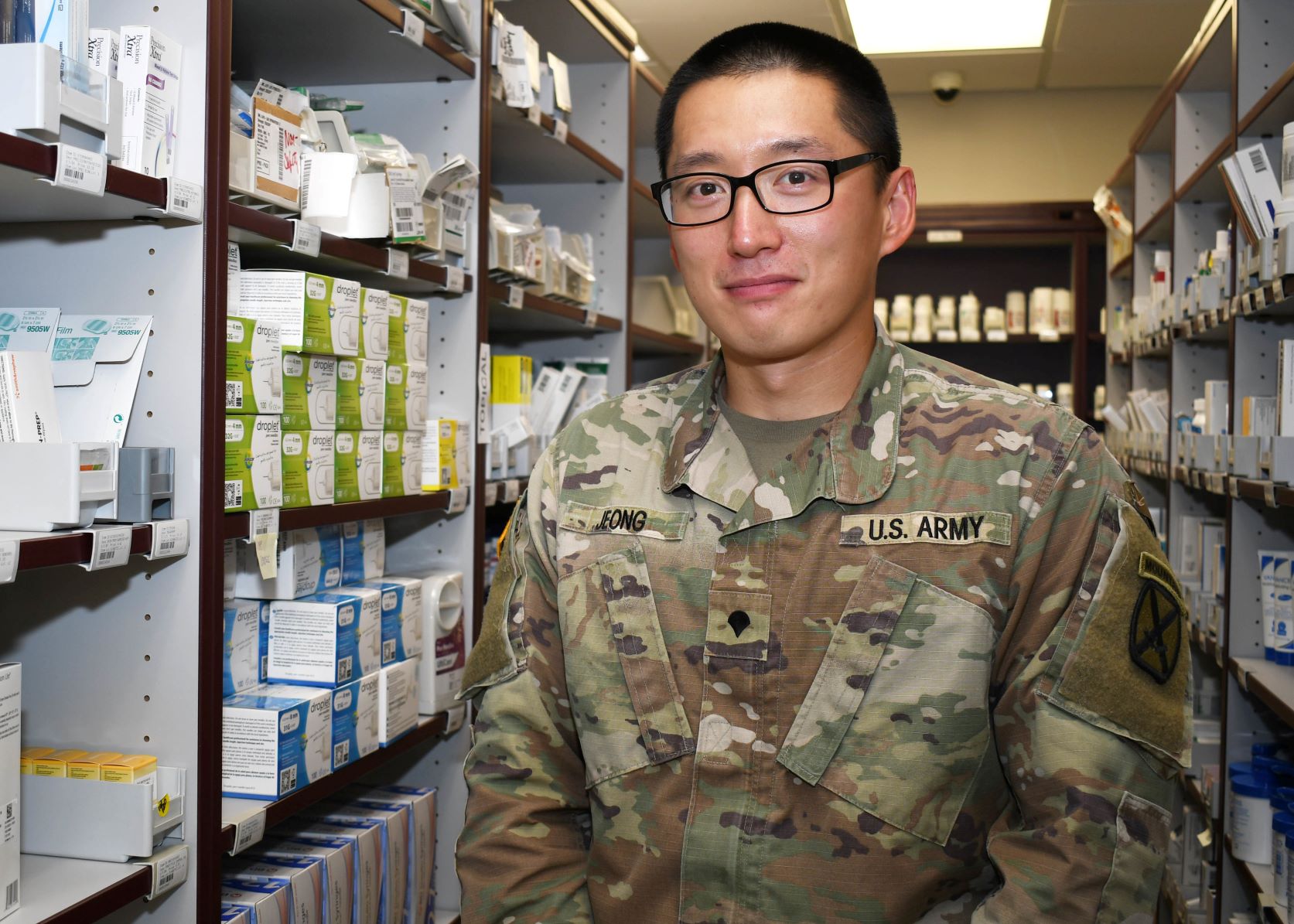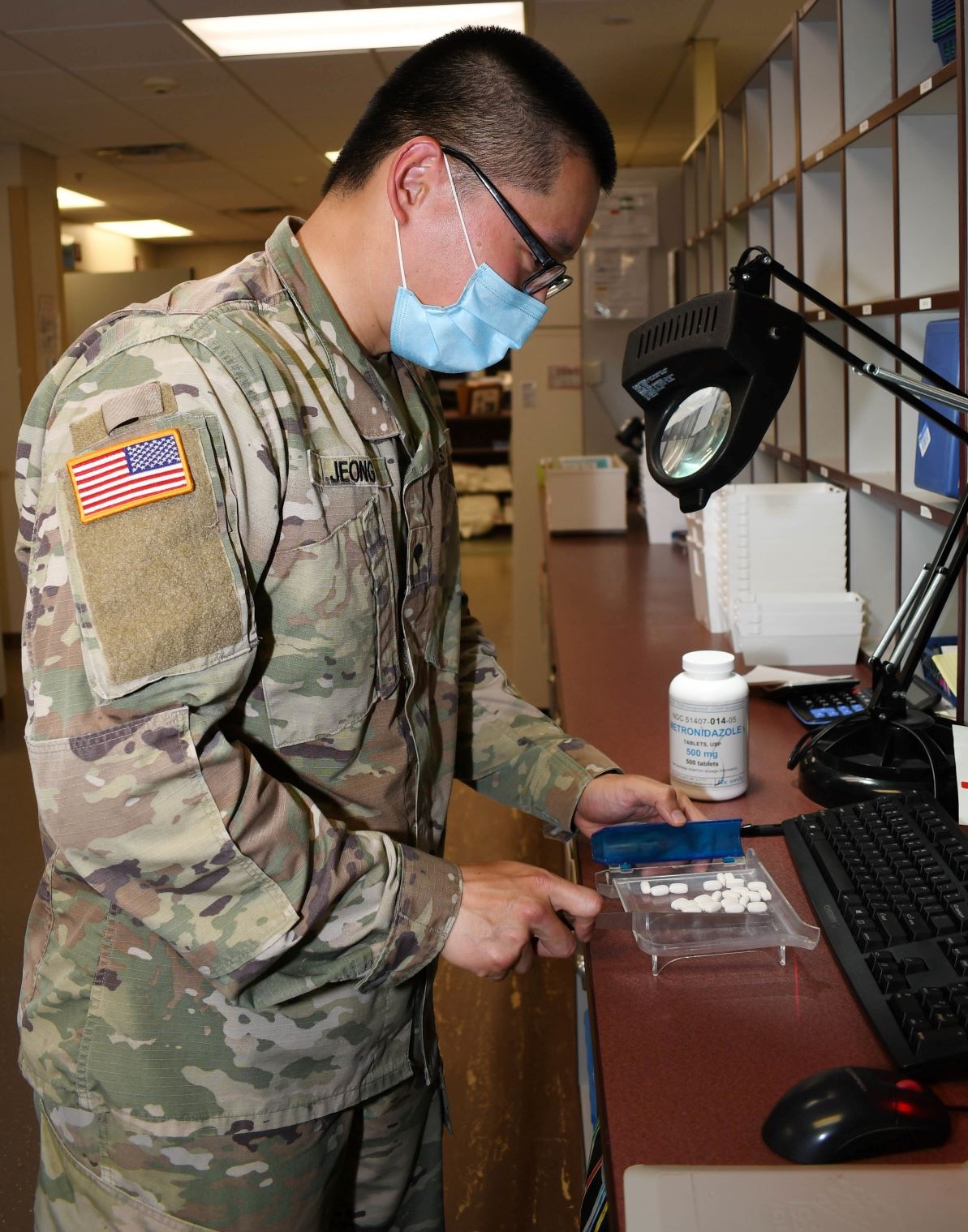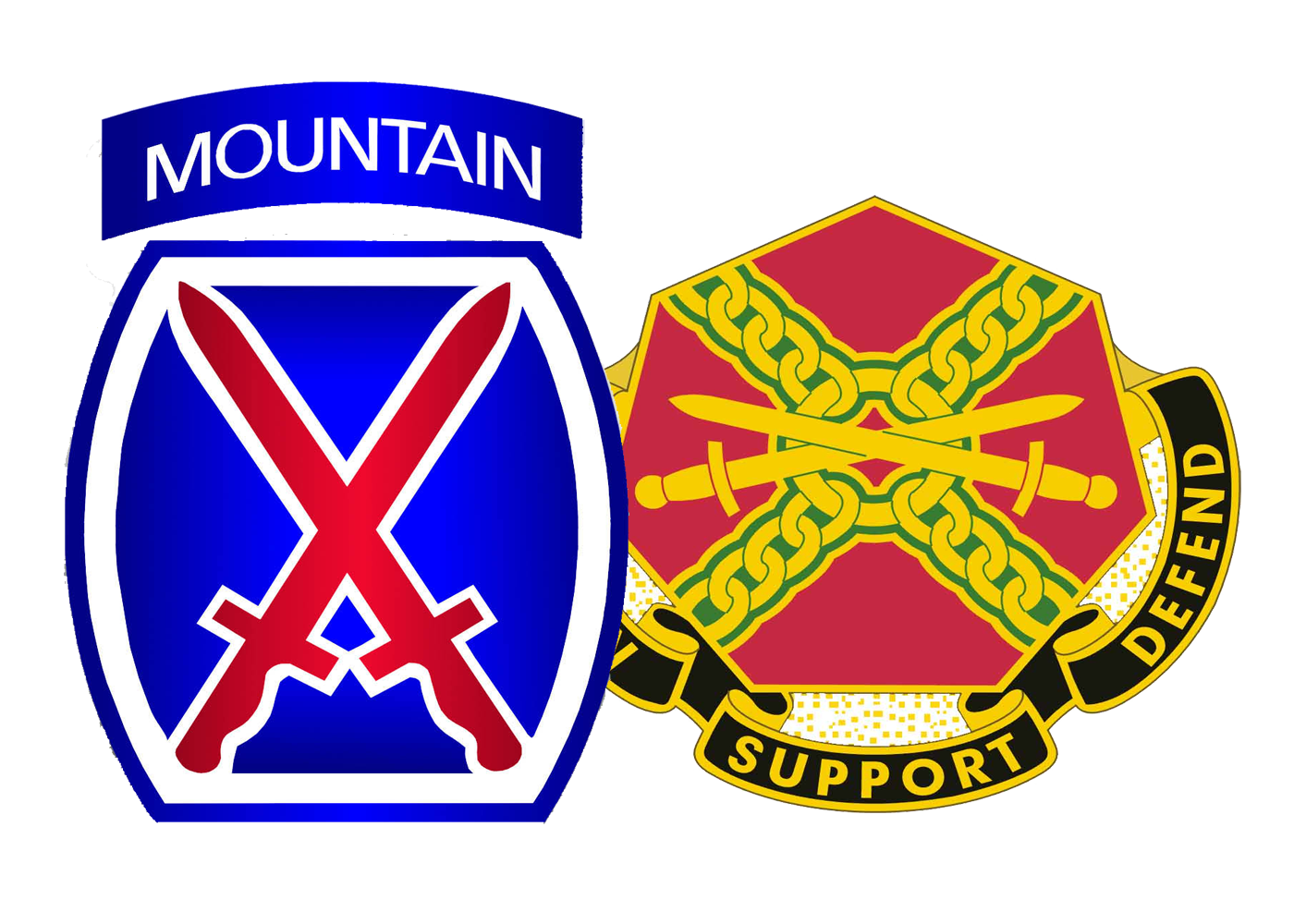
 Spc. Jihoon Jeong, a combat medic with 4th Battalion, 31st Infantry Regiment, 2nd Brigade Combat Team, 10th Mountain Division (LI), stands in front of medication storage June 3 at Guthrie Ambulatory Health Care Clinic Pharmacy in Fort Drum, New York. At left, Jeong counts medication tablets in the pharmacy. Jeong holds a doctor of pharmacy degree and is currently credentialed to work as a pharmacist in the clinic during the COVID-19 crisis. He’s using his experience in the pharmacy to prepare himself to commission as a pharmacy officer in the Army. (U.S. Army photos by Warren W. Wright Jr., Fort Drum Medical Activity Public Affairs)
Spc. Jihoon Jeong, a combat medic with 4th Battalion, 31st Infantry Regiment, 2nd Brigade Combat Team, 10th Mountain Division (LI), stands in front of medication storage June 3 at Guthrie Ambulatory Health Care Clinic Pharmacy in Fort Drum, New York. At left, Jeong counts medication tablets in the pharmacy. Jeong holds a doctor of pharmacy degree and is currently credentialed to work as a pharmacist in the clinic during the COVID-19 crisis. He’s using his experience in the pharmacy to prepare himself to commission as a pharmacy officer in the Army. (U.S. Army photos by Warren W. Wright Jr., Fort Drum Medical Activity Public Affairs)
Combat medic puts advanced education to work in Fort Drum’s Guthrie pharmacy
Warren W. Wright Jr.
Fort Drum MEDDAC
FORT DRUM, N.Y. (June 4, 2020) – The Soldiers who make up the U.S. Army come from multiple backgrounds, cultures, demographics and education levels. Some join the Army straight out of high school, while others wait until later in life after spending time in the workforce or college. And some even join after completing advanced degrees, creating a team of diverse talent and extensive expertise.
At first glance, many would be surprised to learn about the educational background of even the most junior of enlisted Soldiers. Such is the case of Spc. Jihoon Jeong, a combat medic in the 10th Mountain Division's 2nd Brigade Combat Team “Commandos.” Unlike many of his comrades, Jeong entered the Army after completing a doctor of pharmacy degree.
"After graduating, I was looking for a job," Jeong said. "Since I didn't have citizenship at the time, I couldn't get any of the residency spots which I needed to qualify as a clinical pharmacist."
Jeong grew up in South Korea, in the small village of Iksan in the southern part of the peninsula before moving to the U.S. when he was 14. Once in the states, he would live with his aunt and uncle while attending the Life Center Academy in Mount Holly, New Jersey.
Reflecting back to his time as a high school junior, Jeong said, "I had to figure out what I needed to do. Should I go back (to South Korea), or should I stay? And he (my uncle) was a big proponent of staying in the U.S."
At the time, Jeong's cousin was studying to become a nurse, taking a course in organic chemistry as part of her prerequisites for the program. Jeong took notice and was intrigued with how chemistry and health care work together.
"I was looking at the different chemical structures, and I thought it was really interesting," he said. "One binds to another and leads to something completely different, and I thought 'this is really cool.'"
After discussing it with his uncle and doing a little bit of research, Jeong decided on the path he wanted to take.
His uncle said, "Try pharmacy," he recalled. "When I started, of course, it was really difficult at first, transitioning from high school to college. But once I got to the professional pharmacology areas, I thought it was very cool. There was a lot of chemistry involved."
Jeong spent six years at the Albany College of Pharmacy in Albany, New York, before graduating as a doctor of pharmacy. However, because he hadn't obtained his U.S. citizenship, he couldn't secure a residency required to practice as a pharmacist.
"And then I came across the military," he explained.
The Army recruiter told him, "you obviously have a high-level degree and it's health care-related. The Army's always looking for that."
"I looked into it, and it seemed like Army health care was directed more toward health care rather than dealing with insurance," Jeong said. On the civilian side, "we do patient care, of course, but like 60 percent of our work outside the military is dealing with insurance."
Jeong's ultimate goal was to receive a direct commission as a pharmacy officer and eventually move into clinical pharmacy, a more specialized area of pharmacology dealing with direct patient care and developing ways to optimize treatment and therapies for individual patients.
But, Jeong would have to enlist first and choose a career. So, he selected the military occupational specialty (MOS) of 68W, health care specialist, or combat medic, as it's more commonly called.
Because of security and background checks, it would be two years before Jeong would ship off to basic training.
After completing his medic training, he was assigned to work as a health care specialist at the Army clinic on Camp Walker in Daegu, South Korea. That's where he first met Capt. James Mattson, chief of pharmacy at the clinic. After learning about Jeong's advanced pharmacy degree, Mattson wanted to help him complete the paperwork to become an Army pharmacist.
"I tried to get him in Korea," Mattson said. "We had all the red tape worked through, and then he got transferred to a different unit, so it all fell through."
As luck would have it, both Jeong and Mattson would both transfer from South Korea to Fort Drum. Mattson assumed responsibility as chief of pharmacy at Guthrie Ambulatory Health Care Clinic, and Jeong became a line medic with 4th Battalion, 31st Infantry Regiment “Polar Bears.”
Upon arriving at Fort Drum, Jeong wanted to pick up where he left off, getting experience in a pharmacy to make his application packet stronger. He spoke to his leadership and asked, "What do I do to make this happen?"
"They brought me here (to the pharmacy), and I was able to talk to Capt. Mattson," he said. "They were a great help."
In order to work in the pharmacy at Guthrie, Jeong would have to become credentialed. The process would have taken quite a while to complete; however, due to the COVID-19 crisis, leaders with the U.S. Army Medical Department Activity on Fort Drum were able to expedite the process.
Now, Jeong works full time in the pharmacy while still assigned to 4-31 Infantry, providing much-needed support to the department during COVID-19.
"We went on protective teams, so if one team went down, the other team would remain and continue to work full time and we would always have pharmaceutical care in the clinic," Mattson said. "Having him here has allowed us to maintain those teams."
"Thankfully, the wisdom of his chain of command and ours saw the value in this," Mattson added. "We needed the numbers and we needed a professional, licensed pharmacist. He made it so it was a seamless process and we could continue to support the drive-in pharmacy as well as operations inside the clinic and around the base."
Jeong's presence in the pharmacy has allowed the department to continue to provide care to Fort Drum beneficiaries while working in teams. In return, Jeong is gaining valuable experience needed for his future as a pharmacist, something that wouldn't be possible without the support of his leaders.
"It's been very important," Jeong said. "They have been very supportive of it. I feel like I can be a greater asset to the military this way."
As a combat medic, Jeong also brings a different perspective to the Guthrie pharmacy. According to Mattson, most pharmacists are career students and they don't get much hands-on experience in other clinical areas.
"(Jeong) definitely brings a different perspective, or an additive perspective to the pharmacy profession," Mattson explained. "In pharmacy, we get tunnel vision, we're in a box and we see everything as pharmaceuticals. But he's got that broader picture. He shows the maturity and the intellect of the doctorate side of the house, and he also shows the professionalism and the military bearing common among enlisted Soldiers."
Jeong's next goal is to become an official Army pharmacist, and the experience he's gaining in the pharmacy will only serve to strengthen his application for a direct commission as a pharmacy officer.
"While working here, I feel like I gained the confidence," he said. "I had a bit of doubt after four years of not practicing. I wasn't sure I was going to be able to do it. But now that I'm in it, I feel like I'm doing a decent job – I'm pretty comfortable."
Mattson said being selected for a direct commission as a pharmacy officer is a difficult process to achieve as the requirements are extensive and only a handful of applicants are selected each year.
"I have no concerns, and I have the highest expectations of him," Mattson said.





